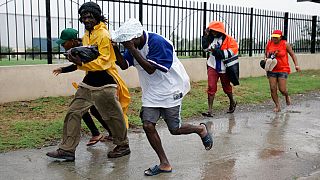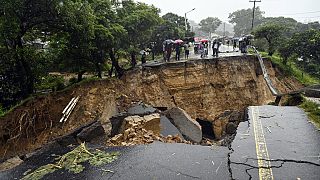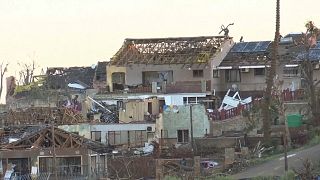Mauritius
Mauritius lifted its highest weather alert and eased a nationwide curfew Tuesday after a deadly cyclone battered the Indian Ocean island, causing heavy flooding and extensive damage in the capital and other parts of the country.
The nearby French island of Reunion was assessing the aftermath of Tropical Cyclone Belal. French Interior Minister Gerald Darmanin said two more bodies had been found, bringing the death toll there to three. One person died in Mauritius.
Belal ripped through the region off the east coast of Africa on Monday and early Tuesday but was now heading further into the Indian Ocean, the Mauritius Meteorological Services said.
The Mauritius government said that the head of the meteorological services had stepped down after his institution was accused of not giving adequate warning about the storm's impact.
Roads in the Mauritius capital, Port Louis, and elsewhere turned into raging rivers on Monday as Belal brought torrential rains and high winds. Some people climbed onto the roof of their cars and clung on, according to videos published by Mauritius' L’Express newspaper.
The person killed in Mauritius was a motorcyclist who died in an accident caused by the flooding, authorities said. The three who died in Reunion all appeared to be homeless people who had not taken cover in shelters.
Mauritius Prime Minister Pravind Jugnauth and other members of his Cabinet visited areas that had been hardest hit, especially in the south. The government said that Belal had left “a trail of damage over the country.”
Mauritius has a population of about 1.2 million people and is a popular tourist destination.
Police were still mobilized across Mauritius, the government's National Emergency Operations Command said, but people could leave their homes. Schools and many businesses were to remain closed until at least Wednesday.
Mauritius had enforced a curfew until noon Tuesday, with everyone ordered to remain at home except emergency workers, some hospital workers and security forces.
On Reunion, residents emerged from their homes Tuesday to clean up. Men in shorts trudged through ankle-high waters down a street in the town of Saint-Paul as winds buffeted the palm trees. Emergency workers scooped up branches and other debris blocking roads.
In the nearby town of Saint-Gilles-les-Bains, trees had crashed onto quays and into the picturesque marina, and several boats were damaged. The winds hit hardest on the higher, inland areas, but roads to reach them remained impassable.
Some 40% of Reunion's 860,000 people had no electricity and nearly half the island was without internet or cell phone service, the head of the local administration, Jerome Filippini, told a news conference. Schools will remain closed all week.
The French government sent some 150 rescuers and electrical workers from the mainland and the nearby French island of Mayotte to help, and Darmanin was expected on Reunion on Wednesday.
Cyclones are common between January and March in the Indian Ocean near southern Africa as seas in the southern hemisphere reach their warmest temperatures. The hotter water is fuel for cyclones.
Scientists say human-caused climate change has intensified extreme weather, making cyclones more frequent and rainier when they hit.
In 2019, Cyclone Idai ripped into Africa from the Indian Ocean, leaving more than 1,000 people dead in Mozambique, Malawi and Zimbabwe and causing a humanitarian crisis. The United Nations said it was one of the deadliest storms on record in the southern hemisphere.













01:17
COP29 finance talks lag as the summit reaches its halfway mark
01:48
Mali's former environment minister launches plan to protect forests
01:35
COP29: What do African youth expect from the climate summit?
01:12
COP29 in Baku: High stakes and a $1 trillion question for climate finance
01:37
UN agricultural fund calls for adaptation financing for small-scale farmers
01:27
2024 likely be the hottest year on record for second year in a row